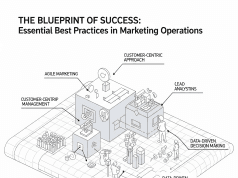In an era where technology rapidly evolves and consumer behaviors shift unpredictably, the marketing landscape is transforming at an unprecedented pace. Organizations that leverage data effectively are not just surviving; they are thriving. Data has emerged as the cornerstone of successful digital transformation in marketing, enabling brands to make informed decisions, personalize customer experiences, and ultimately drive growth.
The Role of Data in Marketing Transformation
1. Understanding Consumer Behavior
At the heart of effective marketing lies a deep understanding of consumer behavior. Data analytics allows marketers to dissect patterns in consumer preferences, purchasing habits, and engagement levels. By analyzing data from various sources (social media, websites, CRM systems), companies can gain insights into what drives their customers. This intelligence empowers marketers to tailor their strategies, ensuring that they target the right audience with the right message at the right time.
2. Personalization at Scale
Today’s consumers expect personalized experiences. Data-driven marketing enables brands to deliver tailor-made content, recommendations, and promotions. For instance, streaming services like Netflix and e-commerce giants like Amazon utilize data algorithms to suggest materials based on individual user preferences. This level of personalization not only increases customer satisfaction but also builds brand loyalty, as consumers feel valued and understood.
3. Enhanced Decision-Making
The speed of decision-making is crucial in the marketing realm. With access to real-time data analytics, marketers can evaluate their campaigns’ performance almost instantaneously. Rather than relying on gut feelings or outdated reports, data provides concrete evidence that can guide strategic decisions. This agility allows businesses to pivot quickly, optimizing their marketing approaches based on current trends and feedback.
4. Optimizing Marketing Spend
Data analytics can also inform budgeting decisions, ensuring that marketing dollars are spent wisely. By assessing the return on investment (ROI) from various channels, businesses can allocate their budgets to the most effective platforms. Predictive analytics can forecast campaign performance, thus maximizing the impact of each dollar invested. This kind of efficiency is vital in today’s competitive landscape, where every cent counts.
Implementing a Data-Driven Culture
Successfully harnessing data requires a cultural shift within organizations. Here are key steps to foster a data-driven mindset:
1. Invest in Technology
Organizations must invest in the right tools and technologies that facilitate data collection, analytics, and reporting. Advanced customer relationship management (CRM) systems, marketing automation tools, and data analytics software are essential for gathering and interpreting data effectively.
2. Encourage Collaboration
Data isn’t solely the domain of the marketing team; it has value across the organization. Encouraging collaboration between departments (sales, IT, customer service) fosters a more comprehensive understanding of consumer behavior and helps generate more actionable insights.
3. Focus on Training and Talent
Equipping teams with data literacy skills is paramount. Training programs can help employees understand how to analyze data, derive insights, and implement data-driven strategies. Hiring data analysts or partnering with experts can also bridge knowledge gaps.
4. Create a Feedback Loop
Establishing a continuous feedback loop is essential for refining data strategies. Soliciting feedback from customers helps brands understand their needs, while internal assessments can reveal how effective current strategies are. This iterative process promotes continuous improvement and agility.
The Future of Data-Driven Marketing
As artificial intelligence (AI) and machine learning continue to evolve, they will play an increasingly significant role in data-driven marketing. These technologies will enable even deeper insights through predictive analytics and automation, allowing brands to anticipate consumer behavior and optimize marketing efforts proactively.
Moreover, the rise of privacy regulations necessitates a responsible approach to data collection and usage. Ethical data practices will not only protect consumers but also build trust, which is invaluable in today’s marketplace.
Conclusion
In conclusion, data is not just a tool; it is the bedrock of successful digital transformation in marketing. Embracing data can empower organizations to understand their consumers better, personalize experiences, make informed decisions, and optimize marketing spend. As the digital landscape continues to evolve, businesses that harness the power of data will not only keep pace but will lead the way in innovation and customer satisfaction. Embracing data-driven marketing is not just a choice; it is a necessity for achieving sustainable success in the digital age.









